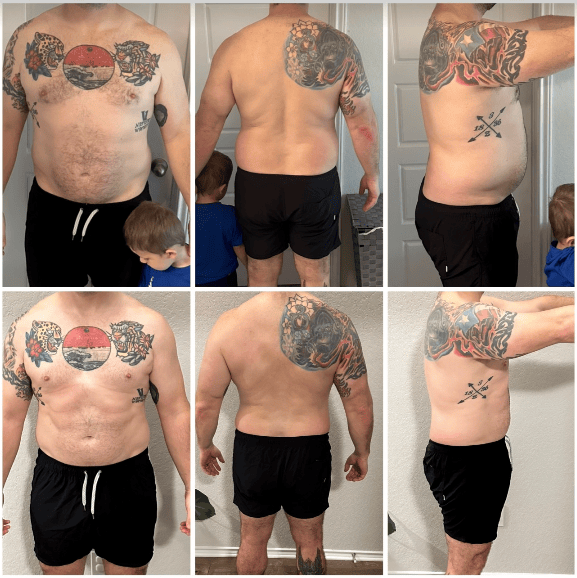It doesn’t look like intermittent fasting (IF) outperforms other meal timing strategies for fat loss when you control for calories and protein intake [1-3].
Honestly, given everything we have learned about nutrition in the last hundred years it does not make any sense that eating less often would contain some kind of calorie-independent fat-loss magic.
Pure and simple the upside of eating less often is that you can eat bigger meals and the downside is that you eat less often.
The biggest potential downside of IF is that if you care about MUSCLE, to my knowledge we currently do not have any studies showing muscle mass gains with only two meals per day and mechanistic research shows increased protein oxidation (burn) and reduced mTOR (growth) signaling at around 18 to 20 hours of fasting [4, 5].
We do have some studies showing lean body mass maintenance with lower meal frequencies and even alternate day fasting combined with exercise [6-9]. There are also some Ramadan studies that show us that gaining muscle with lower meal frequencies may be possible, but that it probably isn’t ideal [10-12]. Keenan et al., 2020 [12] summarized what we know and don’t know about this topic quite well below.
“Lean body mass is generally maintained when IF is combined with resistance training. However, whether or not IF inhibits lean body mass accrual is unclear, and may be contingent on the adequate provision of protein, and energy balance.”
Luckily, we have a new study by Stratton et al., 2020 [13] combined with a few other studies out of Grant Tinsley’s lab that give us some better lines in the sand when it comes to eating frequency and making GAINZ.
- 1)Eat enough protein to maximize the anabolic response to resistance training in at least an 8 hour eating window >0.72 g/lb per day [14].
- 2)Eat at least three meals or snacks of at least (>0.3-0.4 g/kg) AKA 30 to 50 grams per meal or snack for most people. #MyFitFoods
- 3)Train in your eating window [6, 13, 15, 16] AKA have a protein meal or snack before and after training. If you train fasted, you probably want to hedge your muscle gain bets and get 10-15 grams of essential amino acids in before training and then another quality protein meal or snack within an hour of your workout. The Anabolic Window has opened up over the last ten years of research, but in this context protein timing likely still matters.
The rub is that the Stratton et al., 2020 findings are NOT in advanced lifters and I am highly skeptical that an advanced lifter would be able to logistically eat enough food in an 8-hour period to gaintain or gain weight. I’ve tried it. It ain’t easy. Yet, I do think this strategy could work quite well for individuals trying to lose weight and maintain or even gain muscle mass while in a caloric deficit.
Dr. Eric Trexler and Dr. Eric Helms of MASS summarize these points well below.
“For individuals who are solely focused on maximizing their gains, there might be a slight advantage to obtaining 3-5 sufficiently large doses of protein throughout the day.”
“The protein distribution literature doesn’t paint an entirely clear picture yet, and it’s a virtual certainty that total caloric intake, total protein intake, and an adequate training stimulus are far more important than protein distribution or timing. Nonetheless, there are potential benefits and no clear drawbacks from aiming to get about 3-5 sufficiently sized doses of protein throughout the day if you’re interested in absolutely maximizing your gains.”
#GIVEAFIT

REFERENCES:
1. Headland, M., et al., Weight-Loss Outcomes: A Systematic Review and Meta-Analysis of Intermittent Energy Restriction Trials Lasting a Minimum of 6 Months. Nutrients, 2016. 8(6).
2. Cioffi, I., et al., Intermittent versus continuous energy restriction on weight loss and cardiometabolic outcomes: a systematic review and meta-analysis of randomized controlled trials. J Transl Med, 2018. 16(1): p. 371.
3. Schoenfeld, B.J., A.A. Aragon, and J.W. Krieger, Effects of meal frequency on weight loss and body composition: a meta-analysis. Nutr Rev, 2015. 73(2): p. 69-82.
4. Ravussin, E., et al., Early Time-Restricted Feeding Reduces Appetite and Increases Fat Oxidation But Does Not Affect Energy Expenditure in Humans. Obesity (Silver Spring), 2019. 27(8): p. 1244-1254.
5. Soeters, M.R., et al., Intermittent fasting does not affect whole-body glucose, lipid, or protein metabolism. Am J Clin Nutr, 2009. 90(5): p. 1244-51.
6. Tinsley, G.M., et al., Time-restricted feeding in young men performing resistance training: A randomized controlled trial. Eur J Sport Sci, 2016: p. 1-8.
7. Arnal, M.A., et al., Protein pulse feeding improves protein retention in elderly women. Am J Clin Nutr, 1999. 69(6): p. 1202-8.
8. Arnal, M.A., et al., Protein feeding pattern does not affect protein retention in young women. J Nutr, 2000. 130(7): p. 1700-4.
9. Oh, M., et al., Effects of alternate day calorie restriction and exercise on cardio-metabolic risk factors in overweight and obese adults: an exploratory randomized controlled study. BMC Public Health, 2018. 18(1): p. 1124.
10. BaHammam, A.S. and A.S. Almeneessier, Recent Evidence on the Impact of Ramadan Diurnal Intermittent Fasting, Mealtime, and Circadian Rhythm on Cardiometabolic Risk: A Review. Front Nutr, 2020. 7: p. 28.
11. Fernando, H.A., et al., Effect of Ramadan Fasting on Weight and Body Composition in Healthy Non-Athlete Adults: A Systematic Review and Meta-Analysis. Nutrients, 2019. 11(2).
12. Keenan, S., M.B. Cooke, and R. Belski, The Effects of Intermittent Fasting Combined with Resistance Training on Lean Body Mass: A Systematic Review of Human Studies. Nutrients, 2020. 12(8).
13. Stratton, M.T., et al., Four Weeks of Time-Restricted Feeding Combined with Resistance Training Does Not Differentially Influence Measures of Body Composition, Muscle Performance, Resting Energy Expenditure, and Blood Biomarkers. Nutrients, 2020. 12(4).
14. Morton, R.W., et al., A systematic review, meta-analysis and meta-regression of the effect of protein supplementation on resistance training-induced gains in muscle mass and strength in healthy adults. Br J Sports Med, 2018. 52(6): p. 376-384.
15. Moro, T., et al., Effects of eight weeks of time-restricted feeding (16/8) on basal metabolism, maximal strength, body composition, inflammation, and cardiovascular risk factors in resistance-trained males. J Transl Med, 2016. 14(1): p. 290.
16. Tinsley, G.M., et al., Time-restricted feeding plus resistance training in active females: a randomized trial. Am J Clin Nutr, 2019. 110(3): p. 628-640.
About Author: Mario Mendias





